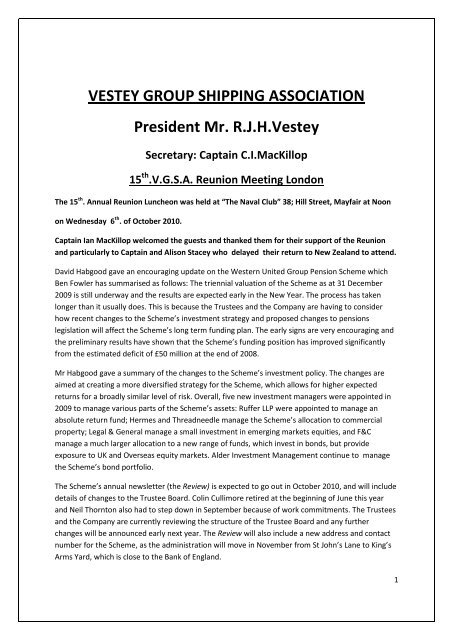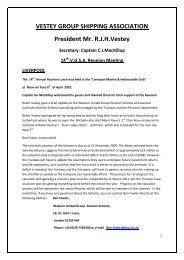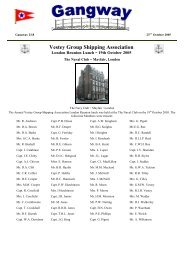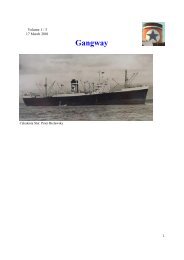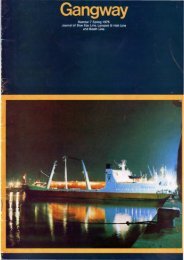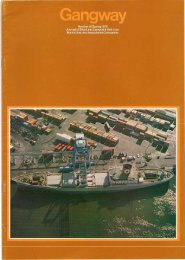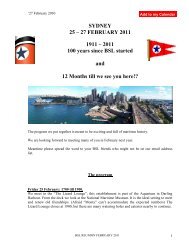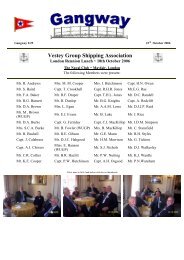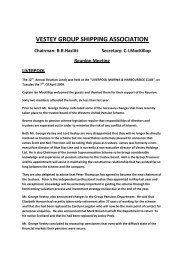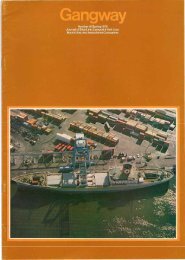Gangway 2/49 Nov 2010 - Blue Star Line
Gangway 2/49 Nov 2010 - Blue Star Line
Gangway 2/49 Nov 2010 - Blue Star Line
Create successful ePaper yourself
Turn your PDF publications into a flip-book with our unique Google optimized e-Paper software.
VESTEY GROUP SHIPPING ASSOCIATION<br />
President Mr. R.J.H.Vestey<br />
Secretary: Captain C.I.MacKillop<br />
15 th .V.G.S.A. Reunion Meeting London<br />
The 15 th . Annual Reunion Luncheon was held at “The Naval Club” 38; Hill Street, Mayfair at Noon<br />
on Wednesday 6 th . of October <strong>2010</strong>.<br />
Captain Ian MacKillop welcomed the guests and thanked them for their support of the Reunion<br />
and particularly to Captain and Alison Stacey who delayed their return to New Zealand to attend.<br />
David Habgood gave an encouraging update on the Western United Group Pension Scheme which<br />
Ben Fowler has summarised as follows: The triennial valuation of the Scheme as at 31 December<br />
2009 is still underway and the results are expected early in the New Year. The process has taken<br />
longer than it usually does. This is because the Trustees and the Company are having to consider<br />
how recent changes to the Scheme’s investment strategy and proposed changes to pensions<br />
legislation will affect the Scheme’s long term funding plan. The early signs are very encouraging and<br />
the preliminary results have shown that the Scheme’s funding position has improved significantly<br />
from the estimated deficit of £50 million at the end of 2008.<br />
Mr Habgood gave a summary of the changes to the Scheme’s investment policy. The changes are<br />
aimed at creating a more diversified strategy for the Scheme, which allows for higher expected<br />
returns for a broadly similar level of risk. Overall, five new investment managers were appointed in<br />
2009 to manage various parts of the Scheme’s assets: Ruffer LLP were appointed to manage an<br />
absolute return fund; Hermes and Threadneedle manage the Scheme’s allocation to commercial<br />
property; Legal & General manage a small investment in emerging markets equities, and F&C<br />
manage a much larger allocation to a new range of funds, which invest in bonds, but provide<br />
exposure to UK and Overseas equity markets. Alder Investment Management continue to manage<br />
the Scheme’s bond portfolio.<br />
The Scheme’s annual newsletter (the Review) is expected to go out in October <strong>2010</strong>, and will include<br />
details of changes to the Trustee Board. Colin Cullimore retired at the beginning of June this year<br />
and Neil Thornton also had to step down in September because of work commitments. The Trustees<br />
and the Company are currently reviewing the structure of the Trustee Board and any further<br />
changes will be announced early next year. The Review will also include a new address and contact<br />
number for the Scheme, as the administration will move in <strong>Nov</strong>ember from St John’s Lane to King’s<br />
Arms Yard, which is close to the Bank of England.<br />
1
If you have a question about your pension, or want to find out more about the Scheme, please<br />
contact Ben Fowler on 0845 2082500 or ben.fowler@wui.co.u<br />
43 members attended<br />
MEMBERS ATTENDING:<br />
Mr. A.Baird, Mr. F.A.Baker, Mr. J.Barclay, Mr. D.A.Brown, Capt. J.G.Calabrase, Mr. A.Carr,<br />
Mrs. M.Carr, Capt. J.E.Chitty, Capt. J.L.Clarke, Capt. C.P.R.Clarke, Mr. C.J.Cornthwait,<br />
Capt. T.C.Crookall, Capt. G.D.Easton, Capt. G.Ferriday, Mr. P.E.Groom, Mr. D.J.C.Habgood,<br />
Mr. B.Hatt, Capt.D.C.Hocking Mr. R.C.Hunnisset, Capt. R.H.R.Jones, Capt. H.Fells (guest),<br />
Capt. A.W.Kinghorn, Mr. B.G.Knights, Capt. C.I.MacKillop, Mr. H.M.Morrison,Mr. E.G.Rae,<br />
Mr. D.C.Randell, Mr. D.J.J.Reid, Mr. R.A.Russell, Capt. J.V.Sheridan, Capt. P.Stacey, Mrs. A.Stacey,<br />
Mr. G.Thompson, Mr. B.Thompson, Mr. R.J.H.Vestey, Mr. D.J.Walkerley, Mr. P.N.Wareham,<br />
Mr. R.L.Wood, Mr. M.MacLeod (guest).<br />
W.U.G.P.F.<br />
Pensions Department : Ben Fowler & Lesley Peek .<br />
Late Cancellations: Mr. E.J.Evans, Capt. W.R.Houghton-Boreham, Carolyn Langdon.<br />
Apologies received: The following sent their best wishes to past friends and colleagues:<br />
Mr. M.Barber, Mr. R.Berry, Capt. A.Braund, Capt. A.J.Brown, Mr. & Mrs. D.A.Burke,<br />
Mr. R.J.Burnett, Mr.R.Bushell, Mr.C.A.Carr, Mr.C.Carr, Capt. A.J.Cheshire, Capt.<br />
A.J.Chivers, Capt. J.E.Clayton, Mr.J.A.Clarke, Mr.C.R.Collier, Mr. M.W.Croft,<br />
Capt.P.H.Daniel, Mr. F.Darrah, Mr.J.I.Davis, Capt.P.B.Dixon, Mr.R.W.Dutton,<br />
Mr.K.Eade, Capt. D.Eckworth, Mr. L.Fiddock, Mr. J.C. Fiddock, Mr.J.C.Freeman, Mr.<br />
E.Gibbs, Mr. G.E.Gunner, Mr.W.A.Harding, Capt. J.R.Howarth, Capt.P.Hutchings,<br />
Capt. P.Hutchinson, Capt.J.R.Inniss, Capt. C.Jackson, Capt. G.C.Jones,<br />
Capt.T.H.L.Jones, Mr.D.Kennedy, Capt.I.C.MacKintosh, Mr. Calum MacLeod, Mrs.<br />
B.malt, Mr. J.Massey, Mr.R.McCormack, Mrs. V.M.Mead, Capt.C.R.Mundy,<br />
Capt.S.Nichols, Mr.P.Nutting, Mr.K.Orpin, Capt.A.H.Osgood, Capt.H.N.owen,<br />
Mr.J.Parry, Mr.P.E.Phillips, Mr.D.C.Plummer, Mr.C.Purser, Mr.J.Rice, Mr.I.Q.Roberts,<br />
Mr.J.A.Roby, Capt.J.F.Rowe, Mr.I.D.M.Simpson, Mr.D.B.Smith, Capt.J.Suddes,<br />
Mr.J.Taylor, Mr.M.C.Towers, Mr.G.M.W.Vestey, Mr.K.J.Wardle, Capt. P.Watson,<br />
Mr.W.H.Watts, Mrs.J.West, Mr.P.Willcock, Mr.B.J.Wilson, Mr.A.L.Wise, Miss<br />
Y.M.Woolgar, Capt.R.A.Young.<br />
New Members: Capt. C.P.R.Clarke, Mr.R.L.Wood,<br />
OBITUARIES & DEATHS. Our condolences to family and friends.<br />
Mr. W.W.Cornwell, Mr. D.A.Ormesher, Mr.R.Parker.<br />
ooooooOOOOOOoooooo<br />
Donations We are most grateful to the following members who have kindly sent donations:<br />
2
Capt. J.R.Inniss, Capt. I.C.MacKintosh, Capt.A.H.Osgood, Capt. P.Stacey, Mr. W.H.Watts,<br />
Mr.P.N.Wareham, plus the remains from a “Tarpaulin Muster” by the “Stragglers!”<br />
FUNDS: At the time of writing, the Association’s bank balance stands at £ 2,191.78 in credit.<br />
Again our thanks to all those who have made donations.<br />
Several members have been enquiring about the possibility of purchasing company ties<br />
but all old stock was exhausted many years ago however, it did prompt the possibility of a<br />
design for an all encompassing logo for the “Vestey Group Shipping Association” first<br />
mooted during the 12 th . Naval Club reunion and had the tentative blessing of the committee<br />
with input from many quarter’s and particular thanks for Captain Cec Jackson’s input who’s<br />
artistic talent was greatly appreciated, also Fraser Darrah and Captain Peter Hutchinson’s<br />
input.<br />
The final logo embodies the initials V.G.S.A with a “V” shaped anchor forming the lower<br />
part of a diamond with the letter “A” forming the upper part of the diamond. The “A”<br />
formed by a setting blue star reflecting triangular rays across white capped sea depicted by<br />
Lamport & Holt funnel colours (white and a lighter blue). The anchor stock forms the<br />
horizontal bar of the “A” and the anchor rings forming a “B” for Booth <strong>Line</strong>. The “G” is<br />
depicted by the famous “Liverpool” cargo hook with it’s distinctive spur protecting the hook<br />
from catching under the coaming during cargo operations when in “Union purchase”. The<br />
“S” is then formed by the twin wires of the union purchase shackled to the hook by a<br />
“monkey face” plate. The “diamond” shape is then enclosed within a Merchant Navy cap<br />
badge.<br />
Enquiries are presently under way for a suitable supplier with a sufficiently small<br />
minimum requirement. The intention is to round up the item cost to the nearest pound<br />
with the remaining pence adding to the V.G.S.A . funds.<br />
Forgive my rather amateurish attempt to copy the design below by the “Paint”<br />
programme on the computer but it will give an indication of the emblem for the tie.<br />
Also my Merchant Navy cap badge was a bit too long in the tooth for a decent photograph<br />
so I amended the “<strong>Star</strong>man” cap badge with it’s rather colourful backing cloth.<br />
The final submitted design will be on a traditional Merchant Navy cap badge design just<br />
to avoid a fit of the vapours from other traditionalists!<br />
3
NEWSLETTER ARTICLES.<br />
Many thanks to Bryans Knights for the following article written about his first trip to sea<br />
with fellow “first tripper” David Conway on the “Norman <strong>Star</strong>” Voyages 92 &93 and the<br />
“Empire <strong>Star</strong>” Voyages 2 & 3 starting in October 1946. Bryans said “The reason that I know<br />
the voyage numbers is that I wrote them in my tables and still have the tables, admittedly<br />
rather battered but still covered with a piece of duck. You probably will not believe this but,<br />
having checked those voyage numbers which are on the inside cover of the tables, I found<br />
The “Clock change” book which I circulated when 2 nd .Off. on the “Paraguay <strong>Star</strong>” and Rowlie<br />
Jones initials as Chief Off.!! Also there is a collection of sailing distances removed from<br />
Brown’s Almanac. Just had a glance through those tables and haven’t a clue how to use<br />
them these days and doubt if the current navigator has a copy anyway. How things<br />
change!”<br />
4
THE OTHER FIRST TRIPPER<br />
The news came in a ‘phone call just after six o’clock one Tuesday morning....<br />
Some time ago I had asked a very good friend of mine, who lives in Auckland, to keep an eye<br />
open for what was the inevitable. He rang to say that the newspaper that morning had<br />
carried the notice that the end had come two days before. From all accounts it certainly<br />
came as a happy release as apart from being bed-ridden, he had suffered considerably over<br />
the last few years.<br />
One hot morning towards the end of June, about five years ago, I was sitting on<br />
the ground beneath the raspberry canes picking a rather good crop, (for many years I have<br />
always picked them that way as I find it easier to see the fruit from underneath). My mind<br />
was in neutral, as it often is on such occasions, when I heard the distinctive sound of the<br />
postman’s van pulling into the lay-by a couple of houses down the road. Always ready to<br />
knock off at the slightest pretext, I left the raspberries and went to see if there was<br />
anything of interest in that morning’s delivery. Much to my delight there was a letter from<br />
David which I then read whilst having a cup of coffee. It was when I returned to the<br />
raspberry picking that I began to think of the past and to realize how true it is when older<br />
folk refer to one’s teens as the impressionable years. I began to consider how much I did<br />
learn in those years and just how much I learned from David during the four trips which we<br />
did together on two ships.<br />
In October 1946 we both joined our first ship, the “Norman <strong>Star</strong>”. She had<br />
returned from South America and discharged on the Continent and was not calling at the<br />
U.K. Some of the crew paid off over there and we were in the group going over to Antwerp<br />
to replace them. I had signed on at Connaught Road the day before, as I presume that the<br />
rest of those joining had done. My Father came with me to London where we met David<br />
under the clock at Victoria station. I would add that I was not so successful some years later<br />
when I had arranged to meet a young lady under the clock at Flinders Street station, as,<br />
when she seemed to be late, I found out that there were several clocks there! I had chosen<br />
the wrong one and had to spend some time running between them all until I found her. (She<br />
was late.) I am not sure just how many of us were in the party but seem to think it was<br />
about twenty in charge of the Second Engineer. I can not remember his name but can still<br />
picture him. The last time I saw him was at Captain D.R.MacFarlane’s funeral at Barham<br />
Crematorium. He finished up as a Superintendant. Peter Coghlan was the Fourth Officer<br />
(not sure of the spelling so hope that it is correct.) It is a funny thing but having written that<br />
he was the fourth, I now have doubts as to whether he travelled with us. The Fifth Engineer<br />
was Dougie Bourne on his first trip and last time we met he was Chief Engineer. The only<br />
other name I can remember is Bob Banks who was the Cook as I met him on another<br />
occasion which I think was in Auckland when the “Norman <strong>Star</strong>” did her only voyage ( in<br />
recent years) to N.Z. after I had left her.<br />
5
At Victoria station my father suggested that our baggage was registered so that<br />
all we had to do was to collect it at Brussels. It certainly saved us the problem of looking<br />
after it on the way across but when we arrived in Brussels the customs had knocked off and<br />
would not clear it until next morning.<br />
The result was that the rest went on to Antwerp and the two first trip cadets were left to<br />
fend for themselves. Fortunately David had been to the “Conway” and had also had a spell<br />
at Gordonstoun and had also done a bit of travelling around the U.K. He took us to the<br />
R.T.O. on Brussels station who found us an hotel and arranged for a taxi to pick us up,<br />
collect our baggage from customs and get us on the train for Antwerp next morning. I still<br />
have vivid memories of our evening window shopping in Brussels. We had very little money<br />
so could do nothing but look at those enormous cream cakes covered in chocolate which<br />
seemed to fill every shop window. On signing on at the Connaught Road shipping office I<br />
had been given a letter, probably by someone from head office, to take to the Antwerp<br />
agents. We were on our way to deliver this when we were stopped by a not very tall<br />
gentleman in navy blue rain coat and trilby who had asked us where we were going. David<br />
was a little off hand with him but we showed him the envelope and he told us to carry on.<br />
We were sitting in the saloon that evening for our first meal on board when David turned to<br />
me and said “look over there that is the chap that stopped us in town this morning. It is the<br />
Captain!!” It was Captain Dominic J. Stratta. In spite of getting off on the wrong foot with<br />
him he did not hold it against us and was the first of several first class masters I sailed within<br />
the company.<br />
One of the first things that was decided when we arrived on board, and probably<br />
by Captain Stratta, was that, as we were both doing our first trips and David had less sea<br />
time to do than I did, then he had better be the senior cadet and that was the start of a<br />
friendship that was to last 53 years.<br />
The family had been on holiday at Margate during the summer of 1946 and<br />
during that time my father had arranged for a trip out in the boat when it went to take the<br />
pilot off the “Norman <strong>Star</strong>” at the N.E. Spit, and so the second time that I saw her was from<br />
the bus taking us from the agent’s office in town where we had joined up with the others.<br />
The dock area at that time was still a scene of devastation with heaps of rubble, the Ford<br />
factory was an awful mess with a collapsed roof and I do not remember seeing a single<br />
crane and very few ships. The “Norman <strong>Star</strong>” was at the far end of an enormous dock which<br />
seems to have been known by seafarers as Siberia Dock. It was twelve years before I was<br />
back there and what a difference there was then.<br />
On leaving Antwerp we loaded in Lisbon, Madeira and Santa Cruz de Tenerife a<br />
cargo of dried fruit, fish and wine for Rio, Santos, Montevideo and B.A.<br />
One is not consciously aware that one is learning at that age, or I suppose, at any<br />
age but I do know that I picked up many little bits here and there from David. He certainly<br />
6
told me never to walk around the deck without a bunch of ropeyarns in my hand so that I<br />
always had a ready answer for the mate should he see me and want to know what I was<br />
doing. He did not tell me in as many words but it was because of him that I learned to treat<br />
the sun with great respect. We had had several days at anchor in Rio harbour and when we<br />
went alongside David and I together with the Fourth Officer were on night work as the<br />
stevedores worked around the clock. One morning the other two decided to go to<br />
Copacabana for the day. Needless to say, having been up all night, they fell asleep on the<br />
beach. David finished up with the most enormous blisters which I have ever seen, across his<br />
back... it was many days before he could sleep on his back. I have never forgotten his<br />
suffering and have always been most careful with the old bronzy bronzy since then.<br />
It was in Santos that it was brought home to me that there were dangers in life at sea. We<br />
had again been on night work, this time with the Third Officer, and had not been turned in<br />
very long one morning when there was a commotion out on deck. During the night the<br />
stevedores had refused to go into one of the lower holds when it had been opened because<br />
of gas. We had rigged winds’ls but there was very little in the way of a breeze. The Third<br />
Officer, David Thomas, had gone down into the lower hold to assess the situation and was<br />
overcome by fumes. Among the crew who went down to find him was the Bos’n Jimmy<br />
Truelove who in turn was overcome. David Thomas had collapsed in a dark part of the hold<br />
and was only spotted when someone saw the light reflect off his watch. Both were left<br />
ashore in hospital although the Third Officer did rejoin us later but I believe that the Bos’n<br />
never returned to sea. It turned out that he had sailed as A.B. with my father when he was<br />
at sea many years before. Some time in about the early eighties I met David Thomas again<br />
when we were on an examining panel. On being introduced, I was asked if I knew Captain<br />
Thomas when he said that we had met on the “Norman <strong>Star</strong>”. I must admit that I had not<br />
recognised him. He was a superintendent then and, unfortunately, died a very short while<br />
afterwards.<br />
Homeward bound that trip we had a rather rough crossing of the Bay of Biscay. We had<br />
loaded a full cargo of frozen meat in B.A. and added a load of tomatoes in those flimsy<br />
wooden crates which were common in those days. These filled the after deck with just a<br />
narrow passage on either side so that we were fairly well down. The sea was coming at us<br />
from the starboard side with the ship rolling well. We had been called out on deck to help<br />
the deck crowd secure various items which had started to move and David and I were on the<br />
port side amidships securing some stanchions which had come adrift when a sea came right<br />
over the engine room fiddley and poured down on us. A very good reminder of another<br />
piece of advice which I had been given some while beforehand of “One hand for yourself<br />
and the other for the ship, and the best one for yourself”. The damage to the ship was all<br />
done on the starboard side. The apron around the captain’s deck went as well as the<br />
starboard accommodation ladder. The starboard lifeboat finished up on the engine room<br />
skylight. Unfortunately on its way there it removed the small mushroom vents to the cabins<br />
7
underneath, so they were flooded. In addition it shifted all of the deck cargo which gave us<br />
a port list. There were tomatoes all over the place and we arrived back in London in the<br />
middle of a very cold winter of 1946/7. The result was that, as we had steam winches which<br />
had to be kept running over all of the time to prevent them freezing up, the mess of<br />
tomatoes, bits of wood and packing were frozen solid and only thawed out about three days<br />
after we sailed again on the next trip. The weather in the bay was not that bad but it was<br />
the first time that I had seen what the sea could do and I certainly remembered that.<br />
We both did another trip down to B.A. which was remembered for the number of<br />
times which we broke down. The first time was on the way down Long Reach when tugs<br />
which were running with us had just about disappeared around into St. Clement Reach. In<br />
spite of signals on the ship’s whistle they did not hear them and it caused a bit of concern to<br />
the Chief Officer and Carpenter as the anchor had to be let go with the tide under us.<br />
Fortunately the cable held. I seem to remember that the shackles had been turned in<br />
London and not remarked so that there was confusion as to just how many shackles had<br />
been run out. We finished up with the lot out but only just. This must have been how the<br />
expression “The sparks were flying” originated! We then had to put into the Solent to get<br />
some oil as ours was too thick due to cold. It was about this time that the enormous icicles<br />
hanging over the side from the scuppers began to drop off. Our longest stop was around<br />
the Cape Verde Islands when it took the engineers about three days to make some new<br />
part. I think it might have been on our first trip that that we both learned not to go ashore<br />
without putting in the mosquito ports and switching off the lights. The first and only time<br />
we did not do this we came back on board when we were alongside the Anglo in Dock Sud,<br />
B.A. to find the whole of the deckhead and bulkheads covered in flies. The old Flit Gun<br />
came out and it set them buzzing around the place, it took ages for them all to die. They all<br />
had to be cleared up before we could turn in.<br />
On return to London and after leave, David and I transferred to the “Empire <strong>Star</strong>”<br />
which had just returned from her maiden voyage. She carried 140 passengers in those days<br />
and the cadet’s cabin was ideally situated on the after end of the boat deck adjacent to the<br />
engineers’ lounge. We had our meals in the engineers’ mess room which was just below<br />
our cabin but we were allowed to mix with the passengers and to attend any social<br />
functions which were arranged for them. This social life came to a rather abrupt halt over<br />
the matter, not a serious one I must hasten to add, of a shipboard romance. The Chief<br />
Officer was older than most others in the company at that time as he had been taken<br />
prisoner at the start of the war, with the result that he had been overtaken in the seniority<br />
stakes and there were not many ships left in the company at that time. What happened<br />
was that he and David both had their eye on the same young lady! She, it seemed,<br />
preferred the younger of the two. The upshot was that the cadets were not allowed to<br />
associate with the passengers! That did not worry us unduly. We then took to going for a<br />
walk around the promenade deck after dinner and suitably attired in our No. 10’s This also<br />
8
did not meet with the approval of our lords and masters and so we were hauled up before<br />
Captain J.S.C. Phillips, the senior master in the company, who was known to us lesser<br />
mortals as “Ginger” Phillips. It was he who pointed his finger at David and said “I blame you<br />
for this, you are the ringleader!” (there were only two of us) “You two are striding around<br />
the deck like admirals on half pay” So we were banned from that little evening exercise.<br />
That “Ringleader” bit appealed to David’s sense of humour as he mentioned it two or three<br />
times in later life. There was another time when David and I fell foul of authority and I must<br />
admit that this time I did think that he had gone too far and stayed right out of it. As the<br />
“Empire <strong>Star</strong>” carried more passengers than any other ship in the company at that time, the<br />
two of us and the deck crowd used to turn –to at 0600 to clean the passenger deck areas<br />
before they were about. Generally we cleaned the Bridge and the outside brasswork<br />
around the passenger port holes while the seamen holystoned and washed down the decks<br />
and attended to the deck chairs. This meant that wee finished at 1600. We were in the<br />
tropics with the wooden sided swimming pool rigged when we thought it fair that if we<br />
went without the afternoon “Smoko” we could knock off that much earlier and have a swim.<br />
We knew that the captain used to have a swim about three and so was usually clear before<br />
we were free to go in, and if he wasn’t then we did not have long to wait. Something must<br />
have delayed the captain that particular afternoon as he was showing no sign of vacating<br />
the pool so that the cadets could use it. Ginger Phillips was just floating on his back with his<br />
eyes closed and certainly at peace with the world. David was getting a little impatient at<br />
having to wait much longer than he was used to waiting. His argument was that we had<br />
finished work, were allowed to use the pool, and so he did. He dived in. I do not know how<br />
much water our captain swallowed but I do know that it was something else we were<br />
prevented from doing. That was David’s last trip there. I did one more with a first tripper<br />
who was considerably older than myself.<br />
David, at times, combined his sense of humour with a certain amount of artistic<br />
talent. This became evident when he found time to produce cartoons, which he did on odd<br />
occasions. When we started at sea we were on the princely sum of £8 per month. This was<br />
made up of 30/- wages, 30/- good conduct money and £5 war bonus. Shortly after, changes<br />
were made and the war bonus was amalgamated into our wages and we were lead to<br />
believe that good conduct pay was being stopped. In actual fact there was no change in our<br />
total monthly pay as we still received £8 per month, but for David the thought of having the<br />
good conduct pay removed produced a cartoon showing Lord Vestey counting his money<br />
and surrounded by a large number of money bags. Underneath was “I’m down to my last<br />
£40,000,000. Better cut out the cadets good conduct money!” After being in trouble on<br />
another occasion he drew a <strong>Blue</strong> <strong>Star</strong> ship high & dry on the rocks with the Captain and<br />
Chief Officer on the Bridge and looking over the side with the words “Well we can’t blame<br />
him for this!” Another one of his efforts nearly caused a wharfie strike in Auckland, as he<br />
stuck it in the cadets’ window. It showed the ship alongside with a derrick outboard and a<br />
single bale of wool hanging on a strop. The wharfies were sitting there playing cards and<br />
9
one of them just hanging up the ‘phone and saying to his mates:- “Righto lads, knock off. It<br />
is raining in Dunedin!” I am not sure how the Chief Officer managed to talk his way out of<br />
that one.<br />
He always had an eye for making an honest penny, although some of his ideas did<br />
not meet with the approval of his superiors, at least they didn’t when I was with him at sea.<br />
One of his ideas was to buy cigarettes from the Chief Steward and then raffle them among<br />
the crew. They were packets or tins of 50 in those days and I am not sure how much he<br />
charged, probably 3d or 6d a ticket. He did a good trade for a couple of times or so and<br />
then that was stopped. Never did find out if it was because he made more money than the<br />
company or if it was because the cadets were mixing too much with the crew.<br />
I managed to acquire a fair repertoire of songs from him and expect that he in turn<br />
had picked up most of them on the Conway. The words were what one would expect from<br />
such a source and, needless to say, I can still remember most of them. I must also add that<br />
he passed on a lot of good seamanship to me. I suppose that anyone reading this will say<br />
that one of the main things which I should have learned from him was not to get caught.<br />
I lost contact with David for a few years after we parted from the “Empire <strong>Star</strong>” and<br />
the next time I saw him he was married and they had two children and were running an<br />
establishment near the naval air station at Lee-on-Solent. He was very proud of the vast<br />
number of whiskies which they had behind the bar. He also had several barrels of wine<br />
made from fruit normally associated with home brew. He told me that in the intervening<br />
years he had tried flying Fairy Swordfish and had been in command of an advertising craft<br />
which went around the coast steaming up and down off holiday resorts. He said that he had<br />
turned a Swordfish upside down and hit the neon sign on the boat or a low bridge but I take<br />
both of those with a pinch of salt but there might have been a grain of truth there<br />
somewhere. These activities were before he went into the hospitality trade. After a spell in<br />
Ireland running Lord Mountbatten’s place he and his family went out to N.Z. He and his<br />
wife ran several places out there, one being in the Dunedin area and then moving on to<br />
Glenorchy on Lake Wakatipu. Again my knowledge of this time in his life is rather vague as<br />
he had a frustrating habit of writing to say that they were moving in a couple of months or<br />
so to another area but always failed to give me the address. I then had to wait a couple of<br />
years or so before he wrote again. In another couple of years the same thing happened<br />
again. It was about this time that he and his wife parted company.<br />
It was not until the early seventies that I suddenly had a ‘phone call and David<br />
announced that he was in London and that he had an old friend of mine who wished to<br />
speak to me. It turned out to be a girl whom I had first met on our first time in Auckland<br />
somewhere about January 1948. Needless to say I did not recognise her voice as I had only<br />
met her twice but do remember meeting her and her sister. Her father had a farm at<br />
Mangere which was later bought out to make way for the new airport which superseded<br />
10
Whenuapai. I had actually introduced the two of them to David on the second time that I<br />
had met her. She and David were about to leave London on their way back to N.Z. after a<br />
trip here via the trans Siberian railway. That was when we re-established regular contact<br />
after the on and off years. By this time David was producing a magazine for the hotel and<br />
catering trade in partnership with Del and he also had a few other brands in the fire. In<br />
1981 I had a holiday in N.Z. and called on the two of them to find out that David had just<br />
come out of hospital after a heart operation. They were living in a rather large house in<br />
Parnell at that time. Unfortunately the operation did not solve his heart problem and his<br />
condition became more serious, so much so that he and Del came to England for him to<br />
have a replacement heart and he became one of the first to have a heart from a living<br />
person.. in case anyone wonders how that can come about, briefly, it is as follows. David<br />
needed a heart and a Swedish surgeon needed new lungs. It is easier to transplant lungs<br />
and heart together. A donor became available and it was a toss-up between David and the<br />
Swede as to which one had it and it depended on the final match. It was decided to give it<br />
to the Swede but when they removed his heart they found it to be good, when they<br />
expected it to be diseased. So David had the Swede’s heart and the Swede had the donor’s<br />
organs.<br />
David was very caring as far as animals were concerned. Apart from his own two<br />
dogs at home another played a large part in his life. When in England awaiting the<br />
transplant, he and Del rented a house near to the hospital and undertook to look after the<br />
owner’s black Labrador bitch. She was a big comfort to David when he was waiting for his<br />
operation and on his return to N.Z. was most concerned as what would happen to<br />
“Minnow”. (She had that name as all of her litter were named after fish, and she was the<br />
runt.!) He made several ’phone calls to this country to make sure that she went to<br />
someone who treated animals as he and Del did, i.e. as part of the family. Needless to say,<br />
we never regretted the fact that we said that we would have her.<br />
On 17 th . October 1986 I had a telephone call from David who gave me his<br />
congratulations. On enquiring what the congratulations were for he said that it was the<br />
40 th . anniversary of the start of our sea career. I had not given it the slightest thought but<br />
did remember to get the call in first ten years later, before he did.<br />
In 1992 he and Del played a big part in organizing the visit of U.S. veterans to N.Z. to<br />
commemorate the 50 th . anniversary of the Coral Sea. It was about this time that they<br />
decided to move out of Auckland and they bought a property in Paparoa which is on the<br />
road to Brynderwyn to Dargaville, on highway 12, about a couple of hours drive from<br />
Auckland. It was while working around the place that he stood on a rusty nail and finished<br />
up with gangrene setting in. This gradually spread up his leg and his health gradually<br />
deteriorated so that he regrettably suffered over his last years.<br />
11
Yes I did learn a lot in those early years at sea and it is true to say that I learned quite<br />
a lot from David, some of it what to do and some of it, most certainly, what not to do,<br />
which I suppose life is all about. There are several people whom I have met in this world<br />
whose friendship I value, and that of David certainly so. At a time like this I wonder if I<br />
should have told him, but maybe one does not have to tell a friend.<br />
His funeral service was held at St.Mary’s in the Holy Trinity Cathedral, Parnell,<br />
close to where he and Del lived in St. George’s Bay Road for so many years before they<br />
moved to Paparoa. It was a fitting tribute that so many attended to say farewell to a larger<br />
than life character who failed to reach his 71 st birthday by just seven weeks. One last thing,<br />
which says something about him, and that is that the two women to whom he had been<br />
married were among the pall bearers.<br />
Caballeros.<br />
oooooo000000oooooo<br />
Captain A.H.Osgood has kindly donated a little more historical interest, and I quote:<br />
“When I was at the London B.S.L. reunion lunch in October 2009 I recounted to all at the<br />
table how I had received a letter from an old seafarer with a Photostat copy of a page from his<br />
discharge book showing where he had been signed off the s.s.”Viking <strong>Star</strong>” by the Master.... my<br />
Father.... Captain E.H.Osgood.<br />
This gentleman also included a Photostat copy of the s.s.”Viking <strong>Star</strong>”, “The biggest ship to<br />
have gone through Tower Bridge” up to that time 1935.<br />
At the table was Bryans Knights.... he came forth with the information that his Father had been a<br />
Trinity House Pilot (River) and had been the Pilot on that occasion.<br />
A little history revealed after seventy four years. Hope this is of some interest.”<br />
12
DESPATCHING OF NEWSLETTERS & MEMBERSHIP LISTS.<br />
Newsletters and Membership Lists are dispatched electronically to members with e-mail addresses.<br />
Members not on the internet will continue to receive the newsletter via ordinary mail.<br />
The secretary should be notified if members with e-mail addresses do not receive the<br />
correspondence or experience difficulty in downloading the information.<br />
REPORTING OF CHANGE OF ADDRESS, CONTACT NUMBERS AND OCCURANCES.<br />
Members are requested to advise the secretary of their change of address, change of e-mail<br />
address and contact numbers.<br />
Information on the death of a member is usually received via the Pensions Department, however if a<br />
member learns of the passing of a fellow member, please forward this information to the Secretary<br />
as soon as possible.<br />
BLUE STAR LINE WEBSITE.<br />
Members who have electronic mail and are not aware of the existence of the above website should<br />
contact the following address: bluestarline.org<br />
This excellent site is the creation of ex <strong>Blue</strong> <strong>Star</strong> <strong>Line</strong> Chief Engineer Mr. Fraser Darrah. The site,<br />
although named <strong>Blue</strong> <strong>Star</strong> <strong>Line</strong> contains the history of <strong>Blue</strong> <strong>Star</strong> <strong>Line</strong> and Associated Companies.<br />
VESTEY GROUP SHIPPING MEMORABILIA:<br />
BOOKS:<br />
1 X Lamport & Holt by P.M.Heaton £6.00 each + p/p<br />
2 x <strong>Blue</strong> <strong>Star</strong> <strong>Line</strong> at War by Taffrail £6.00 each + p/p<br />
Spare copies of <strong>Gangway</strong>: 1 copy nos. 19,21,31,37,38,43,<strong>49</strong>,50,54,56,57,68,73,74.<br />
2 copies nos. 20,32,52,55,64,67,71.<br />
===============================<br />
14
Mr. Edmond Owen-Humphreys has made a DVD featuring hundreds of photographs of <strong>Blue</strong> <strong>Star</strong><br />
Ships And can be purchased by writing to him at his address : 10; Jessel Court, Westminster, 6061<br />
Western Australia.<br />
=============================<br />
The 16 th . V.G.S.A. Reunion Luncheon will be held at “The Liverpool Marina & Harbourside Club”<br />
Scheduled for Noon on Tuesday 5 th . April 2011. Cost will be advised closer to that date.<br />
Oooooo000oooooo<br />
15


